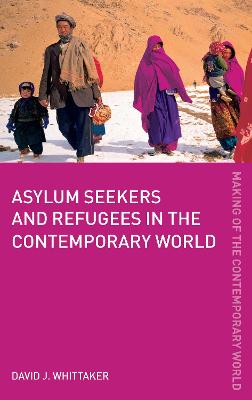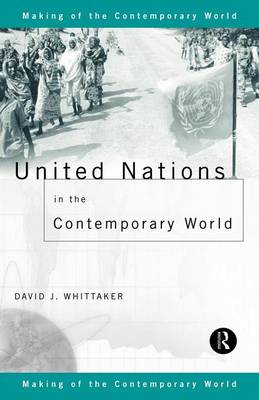The Making of the Contemporary World
4 total works
Asylum Seekers and Refugees in the Contemporary World
by David J. Whittaker
Published 1 January 2005
Examining a number of case studies, including Palestinian, Afghan and Iraqi refugees, David J. Whittaker’s book provides a balanced introduction to this very controversial subject.
Fuelled by extensive coverage in the media, the issue of asylum seekers and refugees is one of the most talked about subjects in contemporary politics. Whittaker cuts through the emotive language to give an objective introduction to the subject.
Asylum Seekers and Refugees in the Contemporary World discusses the international as well as national implications of the issue, and the book looks in detail at the issue as it has affected Britain and Europe in particular, as well as including material on the UN and its response to the refugee ‘problem’.
Including a final statement on the British government’s 2005 proposals for dealing with refugees, this volume is essential reading for all students of the history of the modern world and is ideal for newcomers to the subject.
Fuelled by extensive coverage in the media, the issue of asylum seekers and refugees is one of the most talked about subjects in contemporary politics. Whittaker cuts through the emotive language to give an objective introduction to the subject.
Asylum Seekers and Refugees in the Contemporary World discusses the international as well as national implications of the issue, and the book looks in detail at the issue as it has affected Britain and Europe in particular, as well as including material on the UN and its response to the refugee ‘problem’.
Including a final statement on the British government’s 2005 proposals for dealing with refugees, this volume is essential reading for all students of the history of the modern world and is ideal for newcomers to the subject.
A concise and accessible survey of this topical and complex subject, this is the first book of its type to focus on the terrorists, and their psychology, in an historical context. Focusing on a variety of prominent terrorist groups together with a number of less notorious ones, the book encourages readers to think about the mindset, motivation and tactics of terrorists. David J. Whittaker analyzes examples of terrorists working as individuals, such as Timothy McVeigh, and those working in groups, such as Al-Qaida, over the last two or three decades. He goes on to discuss the problems of countering these terrorists and the possible forms terrorism could take in the future. Fascinating reading, this book will prove extremely informative to any student or researcher of this complex modern-day issue.
Fifty years after the creation of the United Nations, there exists a vigorous debate as to its limitations and possibilities. In United Nations in the Contemporary World, David J. Whittaker examines how the UN works and assesses its position as a world organisation.
The author explores the nature of the UN as a regime in contemporary international relations. He considers the changing terms of reference of the UN and includes discussion of:
* UN organisational procedures and principles;
* recent historical case studies, including studies on peacekeeping
* the role of the UN in global urbanisation, arms control and in supplying aid for refugees
* past and future internal reform, goals, achievements
With an annotated bibliography and a helpful glossary United Nations in the Contemporary World provides an interdisciplinary history of the UN and debates the key issues for its future. David J Whittaker gives a cogent analysis of how the UN addresses today's world problems and how it can adapt for the future.
The author explores the nature of the UN as a regime in contemporary international relations. He considers the changing terms of reference of the UN and includes discussion of:
* UN organisational procedures and principles;
* recent historical case studies, including studies on peacekeeping
* the role of the UN in global urbanisation, arms control and in supplying aid for refugees
* past and future internal reform, goals, achievements
With an annotated bibliography and a helpful glossary United Nations in the Contemporary World provides an interdisciplinary history of the UN and debates the key issues for its future. David J Whittaker gives a cogent analysis of how the UN addresses today's world problems and how it can adapt for the future.


